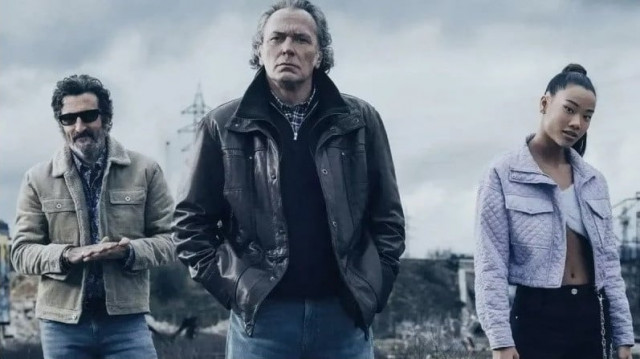Riding the Spanish wave
This Spanish gem, led by the seasoned Jose Coronado, weaves a tale of love, crime, and redemption in heart of Madrid

Ever since I watched Griselda on Netflix, the bot has been storming me with Mexican/Spanish offerings, which I confess, I find quite addictive. As a resultant, I am going through a Hispanic phase, listening to Sr Ortegon, eating omelets, fajitas, burritos and quesadillas as I don’t have the stomach for blood sausage, and tripe.
However, there are more reasons than one for me to enjoy this steady influx of Spanish content on Netflix. These TV shows and movies often explore universal themes and emotions, making them relatable to a wide audience. Since most of Latin America is as third world as Pakistan, the issues are majorly relatable and create a sense of familiarity and shared experience. Plus, it’s a whole different galaxy of stars, as the actors are refreshing, dynamite and different from the Hollywood collection that we are all familiar with.
It seems that shows coming in from non-English speaking countries are breaking the decades old Hollywood hegemony. As far as I know, it began with Money Heist [originally Casa De Papel] in 2017, then 2021 saw the global success of The Squid Game, followed by Lupin, All of Us Are Dead, Elite, Berlin, Wrong Side of the Tracks and many more.
With a straightforward plan for international success, Netflix invests a lot of money in local creators to make high-quality shows that cater to specific countries. While many of these shows may not become huge global hits, they serve as content that attracts and retains subscribers in local markets. Some of these localised productions end up becoming popular worldwide, turning into successful franchises, thanks to Netflix's global platform. This strategy in place since at least 2018, has proven to be quite successful for Netflix.
The latest Spanish show that has become an obsession [at least for me as I hungrily lap up season 3] is Wrong Side of the Tracks, which quickly stormed its way through the top ten trending shows chart. But it is agonising to write about this series without indulging in spoilers.
Mostly shot in the neighbourhoods of Plaza de San Andres and Villaverde Alto, the crime drama series is set in Entrevias, a working-class neighbourhood, located on the wrong side of the railway tracks [featured often in the series] in the south-east of Madrid, in the district of Puente de Vallecas, Spain.
Tirso Abantos is the lead character played by the 66-year-old Jose Coronado, who to me is the Spanish equivalent of Jack Nicholson. Coronado plays a bad-tempered, greying war-hero, frustrated with the rampant crime and delinquency in his neighbourhood. As if he hasn’t had his fill in Bosnia, he wants to play soldier for the rest of his life. This daredevil couldn’t be more up-front, hotheaded, arrogant, stubborn, grouchy and racist. On the plus, he is broody, caring, sensitive and a handsome grandfather. All this minus the psychotic streak that Nicholson conjures. Tirso also has post-traumatic stress disorder, hence freezes up at the slightest hint of love and sentiment, and has a hard time controlling his temper. Through the season, the role sheds layers as Tirso moves through the rapid developments in his life. Mr. Bachan, across the border, would be tempted to sell his Rolls Royce Phantom for this role.
The series opens with a scene where Tirso who is sleeping in his apartment is woken up earlier than normal when he hears an argument and a gunshot from the street outside. He calls the emergency line thrice, explains that he knows a gunshot when he hears it as he served in Bosnia. No one arrives to inspect or check what is going on. In this short scene, Coronado has done what only an actor of his calibre can do, totally hook you, and instantly book you for a binge.
The next day when he is working at his store, a bunch of young guys who ignored him yelling at them to stop the blaring music from their car stereo, get a taste of his vile temper. He bashes their car up with his car and later arrives at his surprise birthday party, his family has thrown for him.
Tirso’s wife has left him for another man, but he permanently lives with a frown. He owns a small hardware store and hangs out with two of his men from the Bosnian war — a café owner Pepe and another veteran called Sanchis who suffers post-traumatic stress, stammers, and uses drugs off and on but his besties keep in line. They love him for the package he is. “Well, look relaxed, we are supposed to be having a good time,” says Tirso to Pepe as they walk into a club. “You look like you are going to see the urologist.’”
Led by Tirso, the adorable trio decides to rid the seedy neighbourhood of junkies, gangsters and young thugs who work for the bigger drug mafia.
A twist comes into Tirso’s grumpy life when Irene [Nona Sobo, a Spanish actress and model], his adopted teenage Vietnamese granddaughter, is sent to live with him by her parents who are in the process of getting a divorce.
Irene is a right pain in the gluteus maximus. She is in Bollywood-type love with a teenager called Nelson (Felipe Londoño), who is involved with other teenage punks who are up to no good. Things get worse when drug dealers rape Irene, and to survive the trauma, she gets hooked on oxycodone. If that isn’t enough, she also gets pregnant and declares she wants to have the baby.
Entrevias in Madrid is a bit like Lyari in Karachi. Crime everywhere and the corrupt cops weak against the drug lords. To add more seasoning, there is another character pivotal to the plot and till the very end, it is difficult to understand whether he is a protagonist or not as he seems to be working on both sides of the law. This is a senior cop named Ezequiel played flawlessly by Luis Zahera.
Tirso and Ezequiel mostly antagonise each other on the crime-fighting track where Tirso finds Ezequiel dubious and untrustworthy. However, their best and most explosive chemistry is as archrivals in regard to Gladys, Nelson’s Columbian mother, who brings a bit of romance in Tristo’s wry life. The only thing unsexy about Gladys, played by Cuban actress Laura Ramos, is her name.
Ezequiel loves Gladys, and proposes to her a million times, but she is too busy struggling with her life as a cleaner, her delinquent son, and her cranky neighbour Tirso, who her heart skips a beat for.
There is seething chemistry between Tirso and Gladys as they slowly progress in their weirdest relationship from hating each other’s face, to not speaking to and banging doors at each other or fighting verbal battles, most of which comes from Tirso’s side, even when Gladys softens down.
The plot is taut and the lines are human, dramatic, quirky, funny and crisp, especially for Tirso, and you cannot LOL at his cynical approach towards everyone, evident from his carefully chosen caustic words to express his disgust and anger at almost everything he confronts.
Apart from the unlimited violence, suspense, action, and a fantastic pulsatile pace that keep you hooked, the series has a fabulous sound track with a variety of the most beautiful and intense music and songs such as Salsa En La Calle by Norbert Galouo & Jose Ortegon Tovar & Pana Black, Se Me Olvido Que Me Querias by Loreley, Mi Vida Cambio by Bengochea, Malito by Nano, Carros y Neones by Hensy Black, Dropyi, Mueka & Dariel, Santana by Dukus and many more, cleverly placed to accentuate the drama at various points in the series.
Created by David Bermejo, who previously gave the hit series Unauthorised Living, also with both Coronado and Zahera, whom he then plucked for Wrong Side of The Tracks. Bermejo tightly packs each episode so that it is happening and hypnotic despite the long run times. You won’t feel that the first episode is 80 minutes long!
The pulpy subject of the series has multiple layers, from the drug world to the police circuit, the characters swarming from the street, and the Abantos family which Tirso heads, with gritty and frail relationships. These characters are genuine and appear strangely familiar because of relatable situations and nuances.
The series does spend a lot of time focusing on the love-hate relationship between Tirso Abantos and his granddaughter. It is intriguing, yet touching to see how the grouchy war vet warms up to her, sacrifices a great deal for her, and even risks his life for her. Irene also transforms from a spoilt, bratty, troublesome teenager to a young woman who begins to see life for all its hard realities. “You can have all the popcorn, you like, but this is not a film in the theatre, this is real life,” says Tirso Abantos to Irene.
More than anything other feature of the series, it is Tirso’s battle against the crime and drug infestation in his neighbourhood that is very relatable. Not that I am going to run out with a little gun tomorrow to take care of my problems or that of my neighbourhood in Karachi. But I can understand how Tirso feels that he belongs to Entrevias, and he doesn’t like the way it is deteriorating at the hands of people who have vested interest. I live in a city where I born in and I have seen it at its prime. Then followed the decades where the decay set in and my city has changed, in only few ways for the better, but in many more ways, it has become worse. Every government promises progress, and then breaks the promises. All I see around me is corruption, neglect, crime, a confused society and strange people moving like robots to make a living, however crooked or twisted that may be. I totally comprehend where Tirso’s anger comes from.
In 2022, Mediaset España, the co-producing company and its free-to-air Spanish television channel Telecinco, decided to roll out season 1 and 2 of Wrong Side of the Tracks in a row. It was a humongous success. In May 2022, the finale was aired which drew an audience of near 1.9 million viewers in prime time. Netflix has recently added the third season, the first episode of which was pre-screened at the Cádiz-based South International Series Festival in October 2023. The fourth will be the final season, keyed up until then.



















COMMENTS
Comments are moderated and generally will be posted if they are on-topic and not abusive.
For more information, please see our Comments FAQ